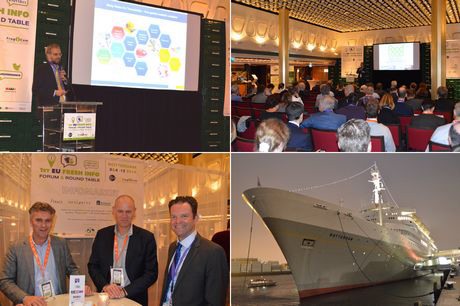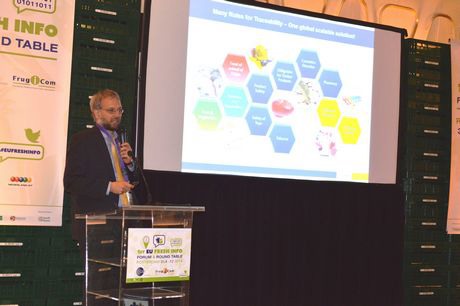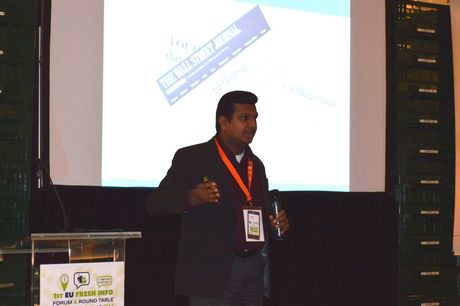
Click here for the photo report
For instance, what would the world look like if no papers were necessary for export anymore, with the required documents being able to be filled in digitally? Theo Hesselink of the World Customs Organization talks about the organization’s work and world trade. Despite the crisis, worldwide trade has grown since 2009. As early as 1997, the G7 declared that standardization was necessary, because the differences between countries hamper trade. The World Trade Organization (WTO) also looks to standardization to promote trade. Worldwide, over 100 countries are working on implementing a standard. “Can information kill paper? Yes it can!” The quality of the data is important though. For instance, when container ship MSC Napoli ran aground at the English coast in 2007, it turned out that nearly all containers were heavier than what was listed on the papers.
Paperless world trade
In the Netherlands, the Ministry of Economic Affairs is working with data in different areas. The NVWA is working on paperless input and output. That causes less administrative pressure, meaning the authorities can work more efficiently, and the system becomes less susceptible to fraud. For a nation of traders like the Netherlands, this obviously bring advantages with it for the traders. For instance, for export to Shanghai and the United States, no paper certificate is needed for many products. The importance of a standard for international trade was emphasized by Tom Quets of Capespan. In the southern hemisphere, digitalization and standardization is lagging behind in some countries, but this is less of an issue in South Africa, for instance, because that country had an export monopoly for a long time.
In addition, the ministry publicizes as many data as possible. These data can be used in a summary for growers, showing, for instance, what crop was grown in what year on what part of the land.

Jens Kugl explains how German retailers use data to inform consumers.
Click here for the photo report
Speed docking, consumer information and gadgets
But there are also practical examples of using and deploying databases. Edward Heijnen illustrates this with speed docking. By analysing data, a retailer and logistical service provider are able to work together more efficiently. The data show that a truck arriving on time according to the documents, has to wait before the cargo is unloaded. By making this clear, the cause of the waiting time can be dealt with. With that purpose, the speed docking competition was established, which various European countries are participating in. Jens Kugl of German retailer Metro explains that the consumer is also asking for more and more information. Information from the chain can be organized in different ways. Metro uses a system where each link in the chain combines information in a database, which the consumer can access by scanning a QR code.
Through initiatives such as Foodloop and Lovemysalad.com, new media are used to decrease the amount of waste and to increase the consumption of vegetables. Nicole Koenderick of WUR explains that menus can be adjusted with information. Bases on your preferences, various devices can help you make a choice or decrease workloads, for instance through a smart refrigerator that places orders for groceries. That’s a development that will continue over the coming years, Ben van Lier expects. Eventually, it could go so far as devices communicating with each other and taking autonomous decisions.

Sandjai Bhulai from the VU on 'social listening'.
Click here for the photo report
The power of a tweet?
Also interesting is a project by Sandjai Bhulai of VU. Through ‘social listening’, he gains insight into the trending topics on Twitter. The university has developed a system for that, in which all tweets are collected based on keywords and word combinations. Next, insight is provided into what and how many times a subject is discussed on Twitter. One project being studied is the Big Bang Broccoli campaign. Bhulai illustrates this with an example: at one point, the number of tweets about cauliflower spiked. Possible cause? A tweet from this website on the bad situation on the cauliflower market, after which the number of tweets increased sharply. Another tweet from this website, about the large supply of cauliflower two weeks later, started a downward trend.
Today, the visitors further talk in roundtable conversations, discussions and workshops on the importance of ICT for the fresh produce trade.
